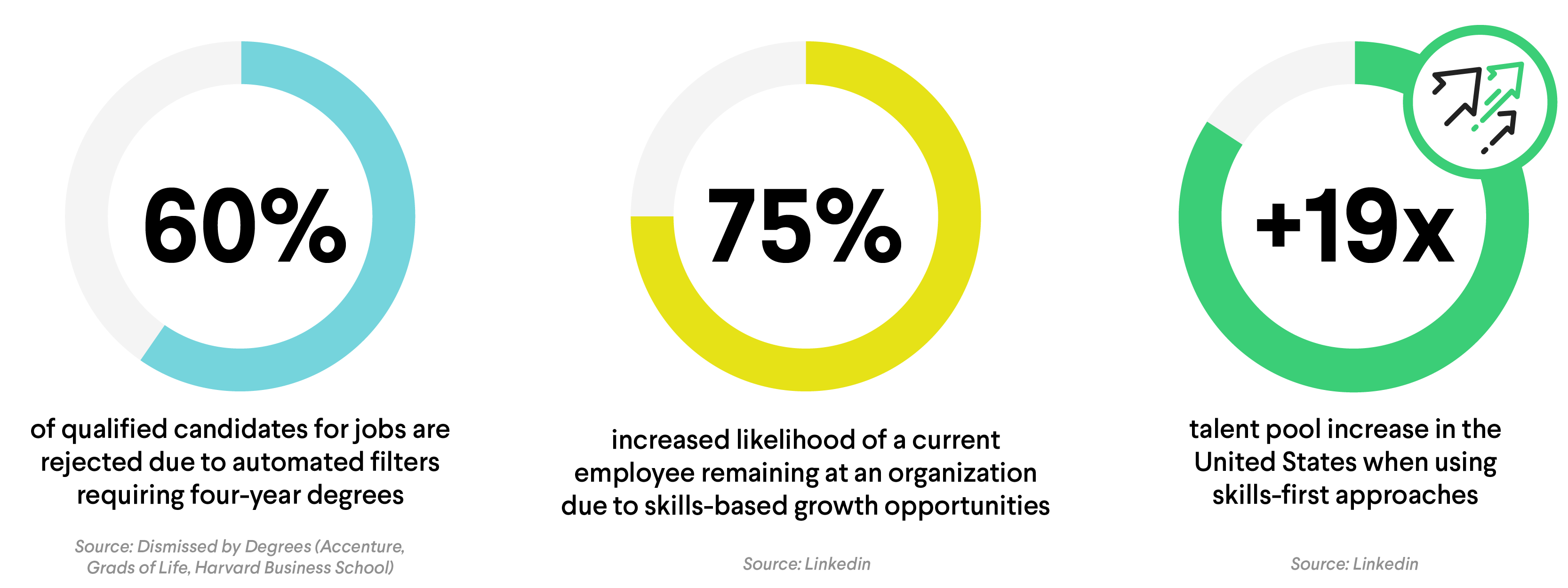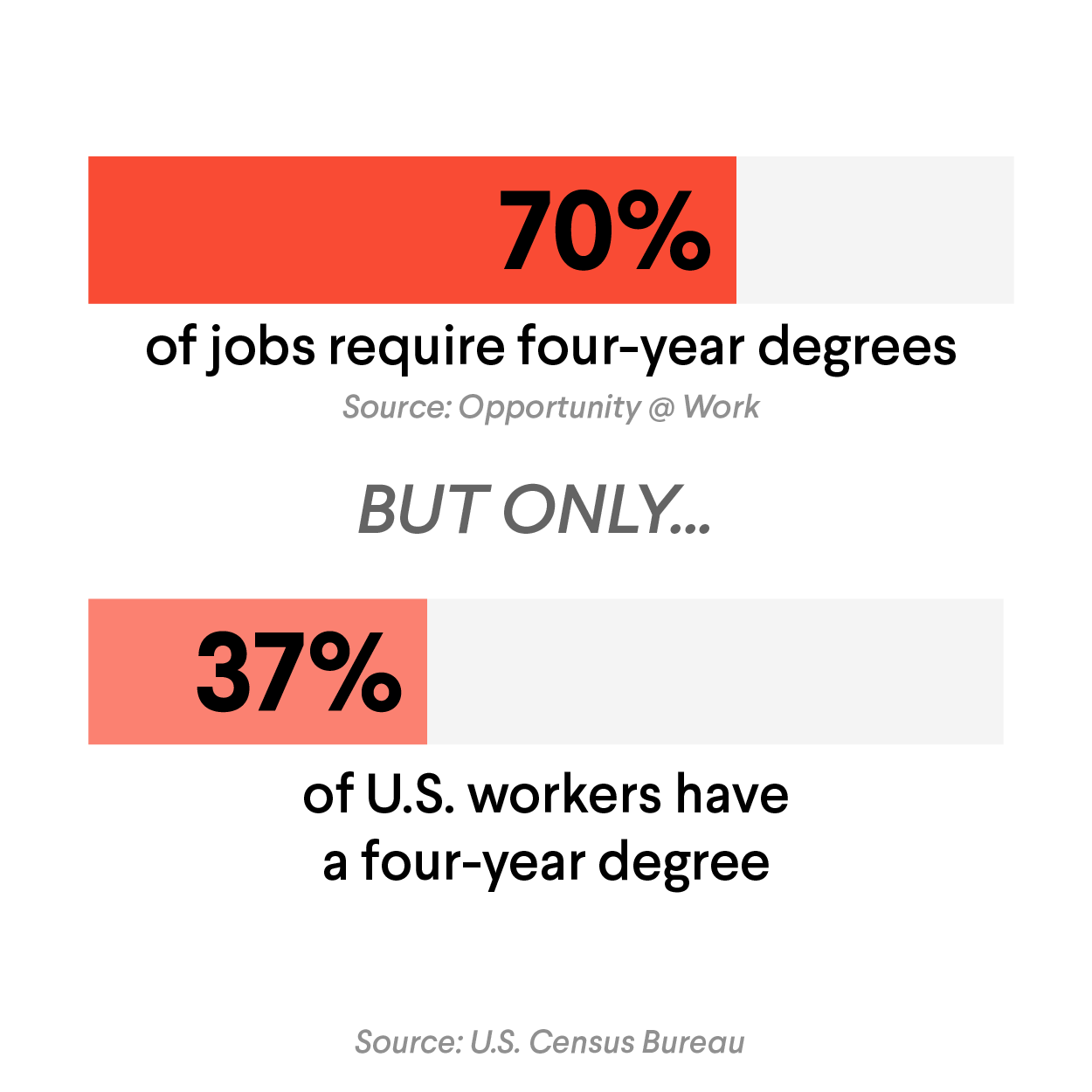Skills are taking the spotlight as the job market continues to shift—and it’s a game-changer for economic opportunity and the future of work.
When it comes to talent practices, workers’ skills are emerging as an increasingly valuable currency in the labor market. This shift is poised to fundamentally change the world of work, and at Jobs for the Future (JFF), we believe, change it for the better.

Degree-based hiring has long been the status quo in the United States, but it remains a practice that creates bias, limits access to jobs, and drives degree inflation. In response to this, employers, educational systems, and policymakers have begun to embrace a skills-first model of training, hiring, and career advancement that goes beyond focusing on the degree as the only measure of learning, and instead attempts to capture a broader set of skills, knowledge, and abilities that demonstrate an individual’s readiness for a job.
Proponents of a skills-first approach—including Jobs for the Future (JFF)—believe that it has the potential to increase the size of talent recruitment pools, create opportunity for populations facing systemic barriers to quality jobs, including Black and Latine workers, and help prepare people for the future of work.

Still, the true potential of skills-first practices has not yet been realized. Well-intentioned efforts to reform recruitment and talent acquisition practices often lack the coordination and resources needed for broad implementation. Fragmented government policies haven’t yet fully incentivized skills-based hiring ecosystems. The commitment required to manage changes for a skills-based future is inconsistent, as data tools must improve and trust in these tools must grow for employers and workers alike to change behaviors.
This means that forward-thinking employers, policymakers, and learning providers who are ready to embrace the skills-based movement frequently find themselves in localized, siloed partnerships or one-off efforts rather than unified engagement across systems and sectors. This is a missed opportunity and is leaving incredible value on the table.
Meaningful change will require unified leadership across sectors—business, government, education, nonprofits, philanthropy, and investors. With support from Walmart, JFF is bringing these partners together to grow skills systems that reimagine talent and advancement. the potential to break down systemic barriers to economic advancement, celebrate the multiple pathways learners and workers take to career opportunity, and showcase the full spectrum of capabilities in the U.S. workforce.
We have identified five catalytic opportunities that we believe can unlock the impact of skills-first models (see table). Over the next year, we will dig into each one, convene partners and leaders who are working to build solutions to address the barriers, and identify and share a set of actionable strategic priorities that stakeholders across the ecosystem can adopt to speed progress.
| Opportunity | Barrier | Solutions |
| Connect Data Systems | Education and employment , including skills data, are located in disconnected databases across multiple public and private systems. | Identify critical investments that will connect data systems and align them to established data standards to enable secure access to comprehensive, individualized skills data. |
| Improve Data Tools | Technology to enable automated sharing of user-friendly skills data across platforms does not exist or isn’t widely implemented. | Promote the development of user-friendly tech tools, including learning and employment records (LERs), to share skills data seamlessly across HR and other data platforms. |
| Address Trust Issues | Many skills-first products and platforms lack transparency and evidence of quality outcomes, undermining consumer trust. | Identify of relevant skills and test customized tools to meet these needs that address partner trust issues. |
| Accelerate Narrative Change | Employers resist changing their long-held beliefs that basing recruitment, hiring, and advancement decisions on degrees and credentials works best. | Develop a compelling public campaign grounded in the benefits and ROI of skills-based practices to a shared understanding of their value-add for partners in the hiring process, such as HR personnel, managers, and others. |
| Align Siloed Skills Movements | Skills-first solutions emerging across sectors lack critical alignment for sweeping change, instead promoting isolated products that fail to address broader problems, including incompatible platforms, tangled policy, disconnected consumers, and inconsistent terminology. | Foster the unification of discrete movements to grow skills-based practices across the learn-and-work ecosystem and address gaps in policy, create incentives, and synchronize promising initiatives. |
This growing movement has both cross-sector and bipartisan appeal. Skills-first approaches are recognized in recent workforce legislation as technical solutions meeting both business and worker needs. States are increasingly eliminating degree requirements and shifting to skills-first policies that foster more inclusive environments. Across industries, major corporations like Accenture, IKEA, and Cisco are also buying in to adopt a skills-first approach to guide hiring, learning and development, and promotion decisions.
Behind the scenes, the infrastructure to support this shift is growing, too: digital skill wallets and credential platforms and integrative technologies like AI are becoming more sophisticated and user-friendly. There’s no doubt that demand is growing for skills-first practices that open economic advancement pathways based on competency instead of pedigree alone.
We are at a unique moment in time to reshape our talent infrastructure with intention and focus on expansive, inclusive opportunity. Centering skills as a valuable currency in the labor market is an economic imperative: By enabling more people to access quality jobs, we can transform U.S. enterprises into global leaders, positioning businesses to reap rewards that transcend mere financial gains.
If we invest now in building a future where skills are the key to unlocking human potential, we’ll be building a future of economic prosperity, building a future of career opportunity, and, as we say at JFF, building a future that works—for everyone.




